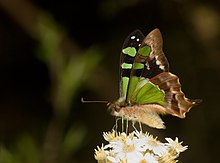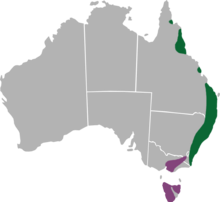
Swallowtail butterflies are large, colorful butterflies in the family Papilionidae, and include over 550 species. Though the majority are tropical, members of the family inhabit every continent except Antarctica. The family includes the largest butterflies in the world, the birdwing butterflies of the genus Ornithoptera.

The scarce swallowtail is a species of butterfly belonging to the family Papilionidae. It is also called the sail swallowtail or pear-tree swallowtail.
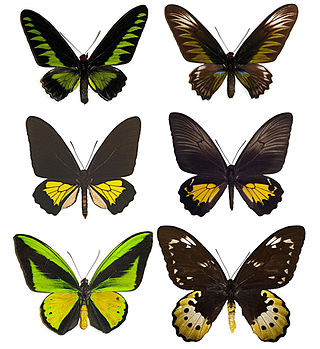
Birdwings are butterflies in the swallowtail family, that belong to the genera Trogonoptera, Troides, and Ornithoptera. Most recent authorities recognise 36 species, however, this is debated, and some authorities include additional genera. Birdwings are named for their exceptional size, angular wings, and birdlike flight. They are found across tropical Asia, mainland and archipelagic Southeast Asia, and Australasia.

Graphium is a genus of mostly tropical swallowtail butterflies commonly known as swordtails, kite swallowtails, or ladies. Native to Eurasia, Africa, and Oceania, the genus is represented by over 100 species. Their colouration is as variable as the habitats they frequent; from rainforest to savannah. Some possess tails which may be long and swordlike, while others lack any hindwing extensions. Graphium species are often sighted at mud puddles.

Papilio demoleus is a common and widespread swallowtail butterfly. The butterfly is also known as the lime butterfly, lemon butterfly, lime swallowtail, and chequered swallowtail. These common names refer to their host plants, which are usually citrus species such as the cultivated lime. Unlike most swallowtail butterflies, it does not have a prominent tail. When the adult stage is taken into consideration, the lime swallowtail is the shortest-lived butterfly, with male adults dying after four days and females after a week. The butterfly is native to Asia and Australia, and can be considered an invasive pest in other parts of the world. The butterfly has spread to Hispaniola island in the Western Hemisphere, and to Mahé, Seychelles.

Graphium agamemnon, the tailed jay, is a predominantly green and black tropical butterfly that belongs to the swallowtail family. The butterfly is also called the green-spotted triangle, tailed green jay, or green triangle. It is a common, non-threatened species native to Nepal, India, Sri Lanka through Southeast Asia and Australia. Several geographic races are recognized. The species was first described by Carl Linnaeus in his 1758 10th edition of Systema Naturae.

Graphium doson, the common jay, is a black, tropical papilionid (swallowtail) butterfly with pale blue semi-transparent central wing bands that are formed by large spots. There is a marginal series of smaller spots. The underside of wings is brown with markings similar to upperside but whitish in colour. The sexes look alike. The species was first described by father and son entomologists Cajetan and Rudolf Felder.

Graphium eurypylus, the great jay or pale green triangle, is a species of tropical butterfly belonging to the family Papilionidae.

Papilio aegeus, the orchard swallowtail butterfly or large citrus butterfly is a species of butterfly from the family Papilionidae, that is found in eastern Australia and Papua New Guinea.

Protographium leosthenes, the four-barred swordtail, is a medium-sized butterfly of the family Papilionidae found in Australia. It is similar to the five-barred swordtail found in both Australia and India.

The silky hairstreak or chlorinda hairstreak is a butterfly belonging to the family Lycaenidae. The species was first described by Emile Blanchard in 1848. It occurs in Australia. It is the only species in the monotypic genus Pseudalmenus, described by Hamilton Herbert Druce in 1902.

Graphium angolanus, the Angola white lady, is a species of butterfly in the family Papilionidae (swallowtails). It is found in Sub-Saharan Africa.
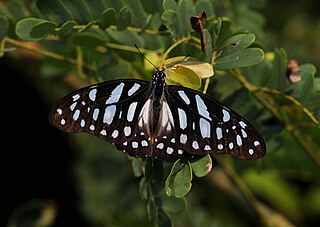
Graphium leonidas, the veined swordtail, veined swallowtail or common graphium, is a species of butterfly in the family Papilionidae, found in Sub-Saharan Africa.

Graphium antheus, the large or larger striped swordtail, is a species of butterfly in the family Papilionidae (swallowtails), found in tropical and sub-Saharan Africa.

Graphium policenes, the common swordtail or small striped swordtail, is a species of butterfly in the family Papilionidae (swallowtails). It is found in tropical Africa.
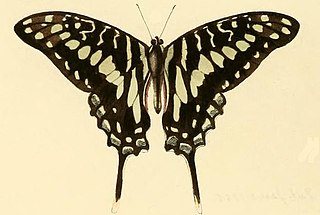
Graphium porthaon, the coastal swordtail, cream-striped swordtail or dark swordtail, is a species of butterfly in the family Papilionidae, found in tropical western Africa.

Graphium colonna, the black swordtail or mamba swordtail, is a species of butterfly in the family Papilionidae (swallowtails). It is found in Africa.

Graphium polistratus, the dancing swordtail, is a butterfly in the family Papilionidae (swallowtails). It is found in Nigeria, the Democratic Republic of the Congo, the coast of Kenya, Tanzania, northern Malawi and Mozambique. Its habitat consists of warm and coastal forests.
